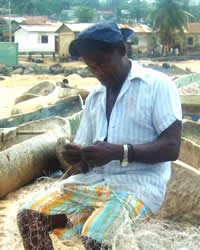Fa d'Ambu in Equatorial Guinea

Photo Source:
Anonymous
|
Send Joshua Project a map of this people group.
|
| People Name: | Fa d'Ambu |
| Country: | Equatorial Guinea |
| 10/40 Window: | No |
| Population: | 9,200 |
| World Population: | 9,800 |
| Primary Language: | Fa d'Ambu |
| Primary Religion: | Ethnic Religions |
| Christian Adherents: | 30.00 % |
| Evangelicals: | 3.00 % |
| Scripture: | New Testament |
| Ministry Resources: | Yes |
| Jesus Film: | Yes |
| Audio Recordings: | No |
| People Cluster: | Sub-Saharan African, other |
| Affinity Bloc: | Sub-Saharan Peoples |
| Progress Level: |
|
Introduction / History
Rising 1,961 feet above the South Atlantic Ocean, off Equatorial Guinea's coast, an extinct volcano named Annob n is home to Fa d'Ambu speaking people. Their island spans 6.75 square miles. Islanders, including those who speak Fa d'Ambu, come from mixed Portuguese, Spanish and Angolan descent. Portuguese people initially populated Annob n villages with slaves from Angola and neighboring islands. While Spain has had a greater political influence on the country for centuries, the stronger cultural influence is from Portugal. Annob n means "good year" and is named for the time Portuguese sailors discovered it in 1472. The Portuguese later gave it to Spain in exchange for Uruguay in 1778. This explains why Spanish is the official language.
What Are Their Lives Like?
Most of the Fa d'Ambus farmers, fishermen and commercial loggers. Annob n's people strongly connect with the sea. So much so, that many women give birth in the ocean. Most of their protein is seafood. An annual whale migration to Annob n waters instigates their traditional whale hunt. Men harpoon the mammals from canoes, then "ski" their crafts behind the giants, connected to the harpoons by heavy, homemade ropes.
What Are Their Beliefs?
Most people in the region practice animism, though about 30 percent claim they are Christian, mostly Roman Catholic.
Most Fa d 'Ambu speakers practice some form of traditional religion. They continue to mix traditional practices with their Christian faith and some cults are growing on this island. Local pastors eagerly request Scriptures to strengthen their congregations in Bible truths.
What Are Their Needs?
For the 30 percent who are Christian, their churches use a different major language translation. Only the New Testament is in their language, so they miss out on the valuable lessons of the Old Testament.
Prayer Points
Pray for Fa d'Ambu family leaders to have a spiritual hunger that will lead them to the cross and the empty grave.
Pray that soon, Fa d'Ambu disciples will be discipling others.
Pray for them to understand and embrace the blessings God has given them and share these blessings with others.